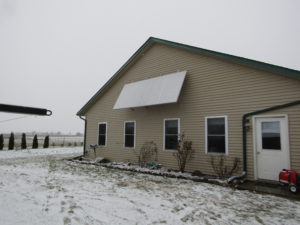
One of the most common questions we hear at Solect Energy is: “Do solar panels still work on cloudy days?” It’s understandable — the idea of harnessing the power of the sun is inherently tied to the idea of bright, sunny days. But what happens when the skies are overcast? Will your solar panels still generate power? The short answer is: Yes, solar panels can still work on cloudy days. But there’s a bit more to it, and we’re here to explain how it works and why solar energy is still an excellent investment, even when the sun isn’t shining brightly.
1. How Solar Panels Work: A Quick Overview
Before we dive into how cloudy days affect solar energy production, let’s quickly review how solar panels generate electricity. Solar panels contain photovoltaic (PV) cells, which convert sunlight into electricity. These cells are made from semiconductor materials (typically silicon) that absorb photons from the sun’s light. When sunlight hits the cells, it excites the electrons in the material, generating an electrical current.
On sunny days, this process is highly efficient, and solar panels can produce maximum power. But what happens when there’s no direct sunlight, like on cloudy days?
2. Cloudy Days Don’t Mean No Solar Power
Cloud cover does reduce the amount of sunlight that reaches the solar panels, but it doesn’t block it entirely. Even on overcast or cloudy days, sunlight still penetrates the clouds. While the intensity of light is lower, solar panels can still capture that diffused sunlight and convert it into electricity.
In fact, research has shown that solar panels can still generate 30% to 60% of their usual output on cloudy days, depending on the thickness of the clouds and the time of year. This means that even when the sun isn’t fully visible, your solar system will continue to provide power.
3. Factors That Impact Solar Panel Efficiency on Cloudy Days
Several factors affect how much power your solar panels can generate on a cloudy day:
a. Cloud Density
The type and thickness of clouds can influence how much sunlight gets through. Thin, wispy clouds allow more light to pass through compared to thick, dark clouds that may block more sunlight. In areas with frequent cloud cover, you might still see your panels producing a good amount of energy — just not as much as on a clear, sunny day.
b. Time of Day
Solar panels generate the most power when the sun is at its highest in the sky. So, even on cloudy days, you’ll still see your system produce more energy around midday, when the light intensity is stronger, even if the sun is partially obscured by clouds.
c. Seasonal Variations
During the winter months, days are shorter, and the sun’s angle is lower. This can reduce the overall amount of energy produced by solar panels, regardless of cloud cover. However, during spring and summer, even with occasional cloudy days, the solar system still benefits from longer daylight hours.
d. Location
Your geographic location plays a significant role in how much sunlight you receive throughout the year. Regions with frequent cloudy weather (like the Pacific Northwest) may experience lower solar output during overcast days, but even then, solar panels can still provide a meaningful amount of energy. In sunnier locations, the drop in performance on cloudy days may be less noticeable because the system will still generate a significant amount of energy on clear days.
4. How Solar Panels Handle Diffused Light
One of the advantages of solar technology is that solar panels can convert diffused light (light scattered by clouds) into electricity. This means that even on overcast days, when sunlight is diffused, solar panels are still working. In fact, some studies suggest that in certain conditions, solar panels can perform better with diffuse sunlight than in direct sunlight, especially if the sun is positioned at a lower angle in the sky.
Additionally, many solar panel systems are equipped with microinverters or power optimizers, which help maximize the energy harvested from each panel. This means your system will continue to perform efficiently, even when the light is less direct.
5. What About Winter and Snowy Conditions?
If you live in a colder climate where snow is common, you might wonder how your solar panels perform during winter months. Here’s the good news: Solar panels can still generate power during winter, even if it’s cloudy or snowy. In fact, snow can be a good thing for solar energy production:
- Reflection: Snow on the ground can reflect sunlight onto the panels, boosting the amount of light that reaches them.
- Cold Weather Efficiency: Solar panels tend to perform more efficiently in colder temperatures, so the lower winter temperatures can actually help your system operate better, as long as the panels are clear of snow and debris.
If snow accumulates on the panels, it’s a good idea to clear it off to ensure maximum performance. Fortunately, solar panels are designed to handle some snow buildup, and most systems will shed snow naturally as the weather warms up or as the panels heat up from sunlight exposure.
6. Battery Storage: Energy for Cloudy Days and Beyond
One of the best ways to maximize the efficiency of your solar system — even on cloudy days — is by pairing it with battery storage. Solar batteries store excess energy produced on sunny days, which can be used later, including on overcast days or during the night. This means that even if your panels aren’t producing as much energy, you can rely on your stored energy reserves to power your home or business.
Having a battery backup system is especially valuable in places where the weather can be unpredictable, as it gives you peace of mind that you will still have power even when the sun isn’t shining as brightly.
7. Bottom Line: Solar Panels Work, Even on Cloudy Days!
While solar panels do produce less energy on cloudy days compared to sunny ones, they still generate electricity and continue to provide value throughout the year. Whether it’s a partly cloudy day or a full-on overcast sky, your solar system will still contribute to powering your home or business, reducing your reliance on the grid, and lowering your energy bills.
At Solect Energy, we are committed to helping you understand how solar energy can work for you — rain or shine. If you’re interested in learning more about how solar can help you save money and reduce your environmental impact, get in touch with us today. Our staff will guide you through the process and help design a solar solution that fits your energy needs.
Have more questions about solar energy? Feel free to reach out! We’re here to help you make the transition to clean, sustainable power — no matter what the weather is like.
